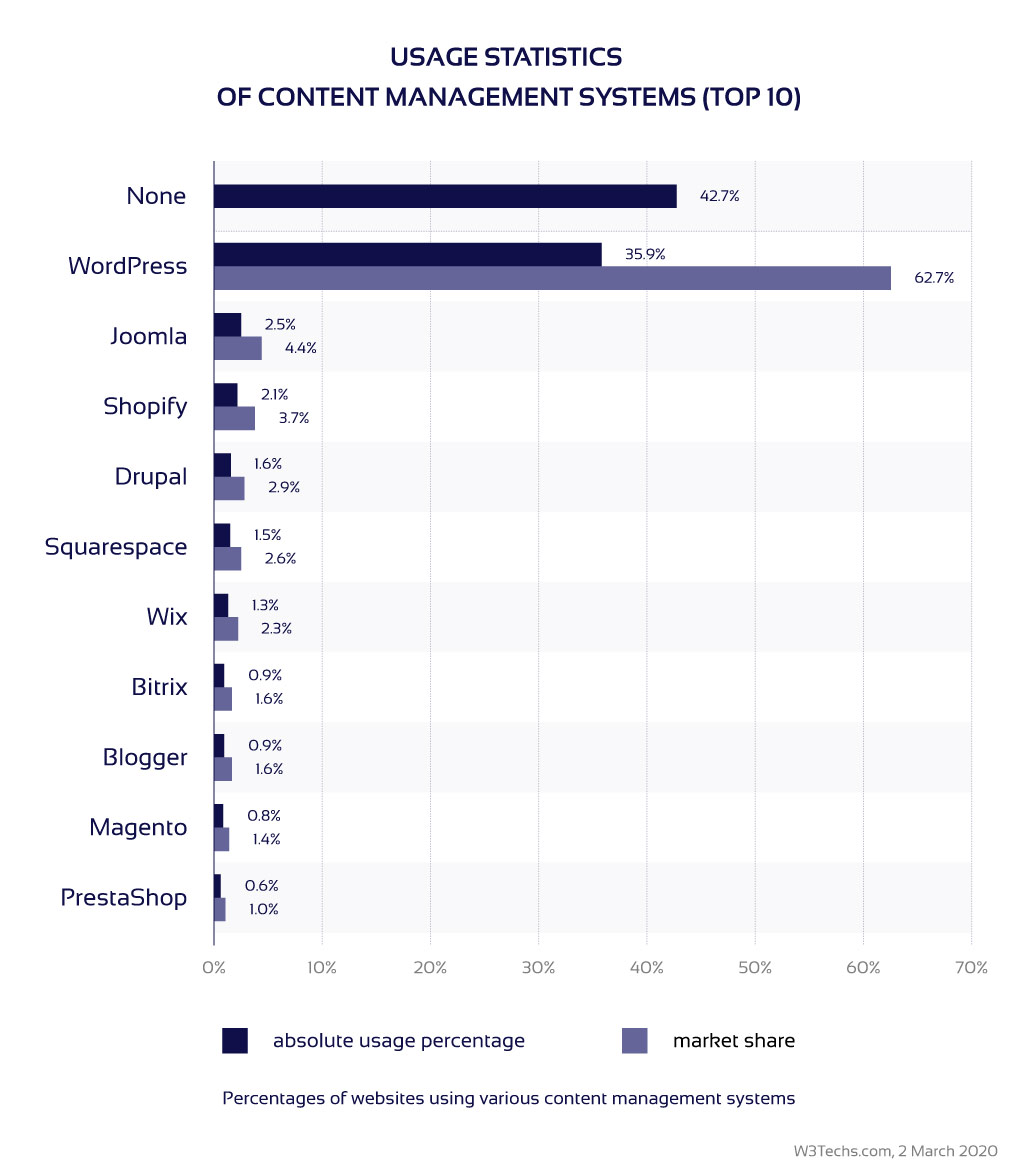If your website updates regularly and has a lot of content, then some type of content management system is a must-have. There are many ready-made solutions that are free and convenient to use. However, the requirements on a CMS raise significantly if you expect to use your website for profits or if you need a corporate-class solution. Let’s discuss why a custom-built CMS is better than ready-made CMS solutions and why you should invest in custom CMS development.
Types of content management systems
While the term “CMS” includes all kinds of content management systems, it most commonly refers to solutions designed for the management of web content. This is because a WCMS is the most popular type of content management software. Let’s look at other types to get a full picture and a better understanding of the concept.
There are several classifications of content management systems based on the nature of the content, implementation areas, and other factors. Some of them are well-defined while others are quite vague. Here is one exemplary division that contains only two CMS types:
- Web content management system (WCMS). It is the most common variety of content management systems. As the name suggests, WCMSs manage the content of websites. They are usually very flexible and can be equally suitable for blogs, news aggregators, online galleries, ecommerce marketplaces, and other site types. Some of them provide a necessary set of features out of the box, while other WCMSs need third-party plugins and services. Examples: Wordpress, Joomla, Drupal.
- Enterprise content management system (ECMS). This is a content management system that has extended functionality and scale. It must be adapted to the needs and peculiarities of corporate use: business automation, analysis, etc. Usually, document management systems (DMS) are also included in this category. Examples: IBM FileNet Content Manager, Xerox DocuShare, OnBase.
Some specialists distinguish other varieties of content management systems as addition or extension of universally recognized WCMS and ECMS. Here are two examples of such CMS types:
- Component content management system (CCMS). It manages structured content based on a different approach that handles content as components rather than documents. Various objects may be regarded as components: paragraphs, definitions, single words. One key feature is that a component is saved in the system only once and then reused via links rather than duplicated. Another characteristic feature is that all components are provided with metadata that facilitates searching, version tracking, and other similar activities. Examples: easyDITA CCMS, SDL Tridion Docs.
- Digital asset management system (DAMS). It functions as a library for digital content, for example, books, audio, video, photos, and other creative works. Usually, DAMS also provides media content publishing and distribution functionalities. Examples: Daminion, Cloudinary, Cumulus.
In existing classifications of content management systems, WCMS is the generally recognized and most popular type. That’s why web content management systems are the focus of this article. This being said, the advantages and comparisons of CMSs will be described from the aspect of a website owner.
What benefits result from using a CMS?
If you own a website, you will benefit from using a content management system in such cases:
- you own a dynamic website that is updated regularly;
- you do not have skills or time to add the required amount of content via code writing;
- you do not have skills or time to perform regular bug fixing and improve website security;
- you do not have skills or time to implement required web design or functionality of the site.
The main purpose of content management systems is to make all content-related operations fast and intuitive for users. For example, publishing content on a website using a CMS does not require programming skills or experience in HTML or CSS. As a rule, content management systems contain easy-to-use editors that employ the principle called “what you see is what you get.”
In addition, many content management systems have a range of preset design variants, downloadable plugins, and other means to fine-tune a website. A content management system also may be an integral component of a sophisticated CMS platform that offers the whole set of features to launch a website from scratch, such as hosting, page constructor, CDN integration, built-in analytics, SEO, and marketing tools, etc. So, instead of deploying a CMS on a server and performing multiple other steps to start a website, a customer may choose such all-in-one SaaS solutions that save a lot of time and effort.
Despite the convenience and other benefits provided by content management systems, there are many naysayers who heavily criticize the established practices of using CMSs. Their opinion is supported by statistics: about 42% of the world’s websites do not use a ready-made CMS.

As you can see from the giving statistics, almost a half of all websites do not use an off-the-shelf solution for content management. However, these numbers are based on the list of over 650 ready-made CMSs. Thus, some of those websites may use custom CMS solutions that did not make it to the list because they were developed exclusively, on demand.
The most popular case when a website does not need a content management system is when the site is static. That means there won’t be any noteworthy changes to the website content. Most often, they are single-page websites, such as landing pages, for example, that function as online business cards or showcases for particular events.
Why choose custom CMS Development over a ready-made Solution?
Currently, there are many off-the-shelf solutions for content management. All of them differ in functionality, payment requirement, source code availability, and other characteristics. Ready-made content management systems can be open-source or proprietary.
The “open-source” model means that those CMS can be used free of charge but may contain paid features, premium plans, or other monetization options. Since they are free, such systems are massively popular. However, this “no-cost” status is the source of many disadvantages that will be described further below. Examples: Wordpress, Joomla, Drupal.
Proprietary CMSs require payment, usually in the form of a monthly or annual subscription, to function. Usually, they have a short trial period or demo mode to examine their capabilities. Examples: Wix, Squarespace, Shopify, Pulse CMS, Sitefinity CMS.
Custom content management systems are unique solutions made specifically for one customer. Their development takes a lot of time and money, but the resulting advantages are worth the initial investments. Let’s see why custom-made CMSs are better than both open-source and paid content management solutions available on the market.
- Better functionality. With ready-made solutions, a user has to adapt to their sets of features, but a custom CMS is designed to suit the client’s needs perfectly. For example, a user of an open-source CMS may find that some necessary features are not available “out of the box.” In this case, features may be provided via third-party add-ons, or by ordering a custom modification of that CMS from a software development team.
- Better scalability. At the planning stage, a development team takes into account the client’s business strategy and plans for the future. This way, a CMS built according to the client’s specifications would have all necessary provisions for the future growth of scale, functionality, and load.
- Better performance. Ready-made content management systems are designed to be versatile so that they offer as many features as possible and meet various demands of a large target audience. A custom CMS does not contain features that the client doesn’t need, so no chunks of useless code. In the case of custom web content management systems, better performance results in higher loading speed that is favorable for visitors and beneficial for SEO ranking.
- Better security. The code of open-source solutions is available to everyone, and so their vulnerabilities are also visible to the public. So, experienced hackers may be aware of hidden backdoors in all popular content management systems and their plugins. The more popular a CMS is, the more it is targeted by hackers . In a custom CMS, the code is known to two parties: the development team and the client. This secrecy enables additional protection to a custom content management system.
- Better design and usability. Off-the-shelf CMSs usually have a wide choice of design templates, color schemes, and even website builder features. However, only a custom CMS can provide a website with the pitch-perfect appearance that strictly corresponds to the brand identity guidelines. In addition to the aesthetically pleasing look, it also allows creating an optimized layout of content blocks. As a result, the custom CMS development is a guarantee the user will spend more time on the website and will be more loyal to the brand.
- Better customer support. Many free and paid content management systems can boast fairly responsive customer support. However, it is no match for aftersale service from a reliable development team. The dedicated team of developers would fix a bug, add a feature, or modify the system whenever the client asks because they are getting paid for it and because they value their business reputation. In this regard, custom content management system development is an investment in the project's stability and efficiency.
- Independence. When it comes to business, it is not wise to rely on a third-party solution. If your profits and reputation depend on a particular software, you’d better own it. The authors of ready-made CMSs cannot be held responsible for any damage that may be caused to a customer’s website because of bugs or vulnerabilities of their software product. Being the sole owner of a CMS makes your online presence more secure and reliable.

As you can see, a custom content management system offers many advantages over non-custom open-source and proprietary CMSs. It may be built using the same technologies as the ready-made CMSs, such as PHP, Java, Python, and others. But unlike off-the-shelf solutions, a custom content management system won’t have their flaws and will be tailored for a particular implementation.
Custom content management systems have two drawbacks, though. First of all, it takes time to build a tailor-made CMS from scratch, whereas you can start using an off-the-shelf solution whenever you want. Second of all, custom CMS development requires significant investments, usually as an up-front payment or as a set of payments spread over the development period. And it is up to every business owner whether a custom content management system development is something they would like to invest in.
Conclusion
A carefully developed custom CMS is a solid foundation for any online project that requires a convenient and safe method of adding, removing, or altering digital content. Custom CMS development is a wise investment for any enterprise, online marketplace, content distribution service, and many other businesses that are willing to pay for extra advantages unavailable in ready-made content management solutions. If you want to become an owner of a tailor-made CMS, contact us. Our developers will provide you with a unique content management system built specifically for you.




